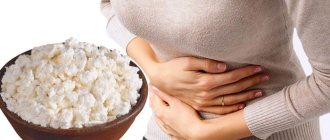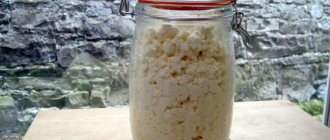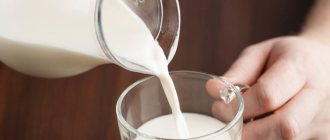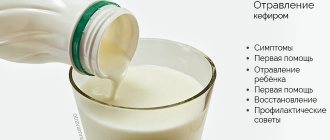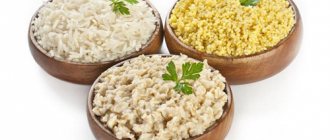Diarrhea from dairy products is a bowel disorder that occurs due to lactose intolerance or deficiency, allergic reactions. If you are deficient in milk sugar, you do not need to completely exclude such products from your diet. In case of allergies and individual lactose intolerance, a therapeutic diet with limited milk is prescribed.
Symptoms of diarrhea
Milk often causes loose stools, and it develops in both adults and children.
Milk diarrhea occurs due to a number of reasons, and by identifying them you can prevent unpleasant, uncomfortable diarrhea. According to medical terminology, diarrhea is a frequent bowel movement with changes in stool.
Diarrhea, caused by internal or external factors, can be of various types:
- Fermentative;
- Infectious;
- Dyspeptic;
- Nutritional.
Each type has its own causes, differs in different symptoms and treatment methods:
- Fermentative diarrhea from milk appears due to excessive consumption of milk sugar, which enters the human intestinal tract with milk. Symptoms of this disease disappear after giving up dairy products.
- Infectious diarrhea is always associated with the appearance of E. coli, salmonella and many others in the human body. The causes of this disease are the use of low-quality, expired products.
- Dyspeptic diarrhea from milk occurs due to an insufficient amount of enzymes that help digest and absorb lactose, which is part of dairy products.
- The nutritional type of diarrhea from milk occurs due to an incorrectly composed human diet. And this disease also manifests itself in allergies to dairy products. Alimentary diarrhea is accompanied by high fever, redness of the skin, discharge from the nose and mucous membranes of the eyes. If you are allergic to dairy products, it is strictly forbidden to consume any of them: yogurt, milk, kefir, cottage cheese. Otherwise, it will lead to an acute form of diarrhea.
Symptoms
Diarrhea after milk and its symptoms are difficult to miss. 30 minutes after consuming a low-quality product or milk that the body does not accept, the following begins:
- Cramps in the lower abdomen;
- Bloating;
- Watery, persistent diarrhea;
- Gas formation.
Causes
Diarrhea from dairy products is quite common; the reasons for its occurrence can be completely different.
Individual lactose intolerance or, as it is also called lactose deficiency, characterizes a feature of the digestive system in which the body cannot absorb milk sugar, lactose.
When milk sugar enters the digestive tract, the body tries to remove it by all means. And the most accessible method is diarrhea or bowel movement. In 90% of cases, lactose deficiency is a genetically transmitted disease.
If the disease is not stopped in time, it becomes chronic, which leads to intestinal dysbiosis.
Allergy
Diarrhea from cottage cheese, milk or cheese may be a consequence of the development of an allergic reaction of the body. An allergy to dairy products can easily be confused with lactose intolerance, but it occurs with more pronounced symptoms: rash, vomiting, swelling of the mucous membranes of the eyes.
Diarrhea may develop as a result of other serious illnesses such as pancreatitis. With this disease, you just have to drink a glass of milk or yogurt, eat cottage cheese, and bloating, diarrhea, and pain begin. And also such symptoms can characterize inflammation of the small intestine.
There is a direct relationship between a person’s age and the ability of the body’s enzymes to digest dairy products. The older you get, the higher the risk that an adult will develop diarrhea due to low digestibility of milk and lactose.
Diagnostics
- When diarrhea appears after milk, it is important to promptly diagnose and determine the causes in order to correctly select the method of further treatment.
- Diarrhea can be the main or additional symptom; to identify pathologies or disruption of the enzyme system, it is worth contacting an experienced, qualified doctor.
- Having contacted, in the first days of the appearance of diarrhea, the doctor can make a diagnosis after examination, based on the clinical picture: bloating, diarrhea, body temperature.
To clarify the possible causes and make the correct diagnosis, a test is performed.
In the morning, before meals, consume 50 g of lactose. If you are lactose intolerant, you will experience the standard symptoms. This is the simplest and fastest method to determine the exact cause of diarrhea from milk.
Treatment
Qualified medical care for diarrhea from dairy products directly depends on the identified causes, which make it possible to prescribe an effective treatment regimen.
Diarrhea may be a secondary symptom when a primary disease develops. To eliminate the symptom, it is necessary to direct all efforts to treat the root cause of diarrhea. However, you should choose drugs that do not contain lactose. It is imperative to exclude all dairy products and adhere to a strict diet.
Milk is a liquid produced by the mammary glands of mammals. Its main purpose is to feed the offspring. The secreted secretion contains nutrients necessary to strengthen the immune system, growth and development of the baby.
Due to the beneficial properties of the drink, milk is used as an independent food product and for preparing culinary delicacies. It is believed to be equally beneficial for both children and adults. However, in some cases, the digestive system reacts to a healthy drink with diarrhea.
We suggest you figure out why diarrhea from milk happens and how to avoid the appearance of an unpleasant symptom.
The composition of milk includes about three hundred components. The main component is water, in which other organic and inorganic components are dissolved. From the point of view of physical chemistry, the drink is a stable colloidal solution. The main substances included in the drink:
- lactose – participates in the synthesis of vitamins and fats, activates the cardiovascular system;
- proteins (casein, albumin, globulin) – the main “building material” that ensures muscle growth;
- enzymes – help release valuable vitamins and minerals from food;
- beneficial nutrients (potassium, calcium, phosphorus) – stimulate the immune system, strengthen bone tissue;
- microelements (iodine, selenium, chromium) – ensure the normal course of physiological processes;
- lecithin – increases immunity, activates brain function;
- cholesterol - participates in the processes of hematopoiesis and the synthesis of vitamin D;
- ergosterol – converted to calciferol (vitamin D) under the influence of ultraviolet radiation;
- retinol and tocopherol (vitamins A and E) – have a pronounced antioxidant effect, strengthen the walls of blood vessels, and have a general rejuvenating effect;
- B vitamins are substances necessary for the normal functioning of the human nervous system;
- citric acid - helps to evacuate heavy metal salts from the body.
Milk contains hormones necessary for normal life, including thyroxine, which regulates lipid metabolism.
Milk is intended for feeding a newborn and, it would seem, it contains everything so that the product is well absorbed by the body. Meanwhile, dyspepsia or “indigestion” after taking it is not so rare. “Milk” diarrhea manifests itself almost immediately after consuming the product. In addition to watery stools, symptoms such as:
- intestinal colic;
- bloating;
- flatulence;
- heaviness in the epigastric region.
Bowel movements occur quite often, and stool may contain particles of mucus.
To avoid such an unpleasant symptom as sudden diarrhea, it is necessary to understand the reasons for its appearance after drinking milk.
Medical practice shows that individual intolerance to the main component of the drink, lactose, occurs in 2% of patients.
In the vast majority of cases, this is a congenital disease in which the body simply does not digest the product. The pathology is caused by a reduced level of lactase, an enzyme necessary for the absorption of lactose.
Among the reasons why diarrhea occurs from dairy products in children and adults are diseases of the gastrointestinal tract, such as:
- inflammation of the small intestine;
- gastritis;
- dysbacteriosis;
- acute or chronic pancreatitis.
With dysbacteriosis, only whole milk is poorly absorbed, while low-fat and fermented milk products are accepted normally by the body. Diarrhea from milk is often observed after intervention on the intestines or stomach. This is a temporary phenomenon that occurs during the postoperative recovery period.
For some people, dairy products are allergens. The antigens here are the serum proteins alpha and beta-lactoalbumin, as well as albumin.
An allergy to dairy products is accompanied not only by diarrhea, but also by skin rashes, swelling of the mucous membranes, and severe itching.
If diarrhea does not go away for several days after milk, this is a reason to suspect the presence of an infection. E. coli or salmonella is found in foods that have not been heat-treated or have been stored for too long. Treatment of diarrhea of an infectious nature requires mandatory consultation with a specialist, and sometimes hospitalization of the patient.
Often the answer to the question why diarrhea after milk began for no apparent reason is the increased fat content of the product. A resident of a metropolis who is not accustomed to fresh drinks will certainly suffer from diarrhea and bloating after tasting the village treat. In addition, milk does not go well with some foods and their combined use can cause dyspepsia.
To find out why milk causes diarrhea, some research needs to be done. The presence of an allergy can be determined by a breath test, which measures the level of hydrogen in the exhaled air after taking lactose. In order to exclude infectious contamination, the patient donates blood and stool for laboratory analysis.
If diarrhea is not infectious in nature, it can be dealt with using the same methods as with a common digestive disorder. The following remedies will help stop milk diarrhea in adults and adolescents:
- Smecta is a natural adsorbent that helps eliminate toxins and eliminate increased gas formation.
- Phosphalugel is a drug of combined action that envelops the mucous membrane, preventing its irritation, and eliminates toxic decomposition products.
- Loperamide is an inexpensive drug that regulates peristalsis and reduces the flow of fluid into the intestinal lumen.
- Linex forte - restores the microflora of the intestinal tract, eliminates bloating.
Why is drinking kefir beneficial?
A drink like kefir is aimed at normalizing the functioning of the gastrointestinal tract and restoring intestinal microflora. However, we are talking only about the use of fresh kefir, because a product that has a shelf life of more than a week cannot be taken and can provoke even greater problems. In addition, kefir contains useful micro- and macroelements, vitamins necessary to improve immunity.
In addition, an adult should take the drink because of:
- Ability to inhibit the development of bacteria that cause diarrhea;
- Ability to strengthen the immune system and cleanse the body of toxins;
- Quenching thirst;
- Restoration of damaged intestinal epithelium.
It is these properties that have made kefir an incredibly useful and popular drink, including in the treatment of diarrhea.
How is the diagnosis carried out?
Identifying milk allergies
First you need to understand the causes of diarrhea. The patient must undergo a milk sugar tolerance test. The study is carried out orally.
You can find out if you are lactose intolerant by taking a breath test. During the examination, the level of hydrogen in the exhaled air is measured.
The human body reacts differently to dairy products. To identify lactose intolerance in chronic constipation, the patient undergoes a special test.
The procedure involves a person taking 50 grams of lactose in the morning on an empty stomach. If there is a deficiency of enzymes, the patient experiences symptoms of diarrhea. Determining the right product can only be done through trial and error.
In order not to harm your health, you need to consider the following points:
- Introducing several dairy products into the diet at once increases the risk of diarrhea;
- Milk should not be drunk in large quantities. This only provokes the development of diarrhea. Enzymes are needed to digest milk sugar.
- Enzyme deficiency leads to diarrhea. However, milk has great value for humans. The calcium it contains is involved in the process of bone tissue formation. In addition, milk contains vitamins necessary to maintain vitality.
Lactose intolerance
The cause of diarrhea is the inability to digest lactose. In this case, it is important to determine its degree by conducting a series of studies:
- Breathing test. The level of hydrogen in exhaled air is measured.
- Tolerance test. The procedure is performed orally.
Since the body reacts to food differently, it is necessary to carefully monitor its reaction to the dairy product introduced into the diet.
Diarrhea after cottage cheese
If a person is prone to intolerance, avoiding cottage cheese is an important measure; it contains milk sugar.
Diarrhea after sour cream
People with lactose intolerance should avoid sour cream; eating it will lead to indigestion.
Diarrhea after cheese
People who are unable to digest milk sugar will have to be careful when eating homemade cheeses.
To determine which product to eat without harm to health, it is important to adhere to a number of rules:
- The diet involves one dairy product at a time.
- The product is recommended to be consumed in small portions.
- Reduce intake of milk and products with high lactose content.
By following simple recommendations, you will be able to avoid unpleasant consequences from dairy products.
What diseases may this indicate?
Diarrhea is an acute condition that accompanies the underlying disease.
- if diarrhea after milk occurs regularly, the reason is individual lactose intolerance;
- diarrhea due to milk drunk in large quantities indicates enzyme deficiency;
- if, in addition to diarrhea, a rash bothers you, these are allergic reactions;
- stool disorders indicate recent surgical interventions, internal diseases - pancreatitis, short bowel syndrome, oncological tumors.
Diagnosis
Although the reasons why an adult develops diarrhea after drinking milk are very varied, it is important to immediately rule out true or temporary lactose intolerance.
Diagnosis is carried out as follows:
- Lactose tolerance test . It is done first. The patient drinks 50 ml of milk on an empty stomach. If corresponding symptoms (bloating, urge to defecate) occur within half an hour, lactase deficiency is suspected.
- Breath test . Determines allergies to dairy products. It is determined by the amount of hydrogen that the patient exhales.
- Stool culture for dysbacteriosis. Helps determine the ratio of beneficial and pathogenic flora in the intestines.
- General blood test, stool for coprogram. These studies are carried out to establish other possible ailments (inflammation, infectious diseases), if lactose intolerance or dysbiosis are excluded
- Instrumental procedures : ultrasound, x-ray. They are prescribed to assess the condition of the gastrointestinal tract.
Is it possible to consume low-fat dairy products if you have diarrhea?
| Group of drugs | pharmachologic effect | Representative drugs |
| Electrolytes | Normalization of water-salt balance | Regidron, Hydrovit |
| Probiotics | Restoration of gastrointestinal microflora | Linex, Hilak |
| Sorbents | Binding and removal of toxins | Activated carbon, Polysorb |
| Antidiarrheals | Stops acute diarrhea. Take it if an adult’s diarrhea does not stop for a long time after drinking milk | Loperamide |
| Enzyme-containing drugs | Accelerates digestion of food bolus | Pepsin, Mezim, Laktazar (for children) |
| Nonsteroidal anti-inflammatory drugs | Analgesic, antipyretic, anti-inflammatory effect | Aspirin, Ibuprofen |
Medicines are taken as prescribed by a doctor.
The effect of lactose on the body
Many people think that skim milk contains less lactose. However, in reality this is not the case. The risk of diarrhea after consuming low-calorie dairy products is quite high.
Diarrhea after milk cannot be prevented by reducing the fat content of the product. It is necessary to reduce the amount of lactose, which is the cause of digestive upset.
Some people produce so little of the enzyme that even a small amount of milk can cause diarrhea. Despite the high level of lactose, yogurt is better absorbed in the human body. Much depends on the type of this product.
Pasteurized yogurt cannot be called healthy, since it does not retain the bacteria necessary for the body. Patients with this pathology will appreciate chocolate milk. It has a pleasant taste. This product contains calcium necessary for the body.
Cocoa stimulates the production of enzymes necessary to digest lactose.
The list of healthy foods includes some types of cheese. Cheddar and mozzarella contain a lot of calcium, which is easily absorbed in the intestines.
The advantage of such products is their low lactose content. This allows the cheese to be used even in severe forms of the disease. Unlike cheese, cottage cheese often leads to diarrhea.
Nutritional Features
What should everyone know about using dairy products in food? The following information will help you avoid mistakes and consume dairy products without harm to your health:
- It is a mistake to think that skim milk contains less lactose. The same goes for buttermilk and acidophilus milk.
- Yogurt is safer in terms of the risk of diarrhea. Many people tolerate yogurt well, although it also contains lactose. It must be remembered that the body can also react differently to different yoghurts. Pasteurized yoghurts are not very healthy.
- Chocolate milk has many positive qualities that people with lactose intolerance will appreciate. On the one hand, such milk has a pleasant taste, and contains calcium necessary for the body. On the other hand, cocoa helps stimulate lactase activity. This product is well tolerated.
- Swiss cheese, cheddar, mozzarella and parmesan are healthy and safe. They are rich in calcium but contain very low levels of lactose.
- People with lactase deficiency need to be very careful with cottage cheese, homemade cheeses and ricotta.
Diarrhea from milk in adults: causes, treatment
The result of treatment depends on the correctness of the diagnosis.
Diagnostics include:
- Take 50 grams of lactose on an empty stomach in the morning. Diarrhea caused by taking milk sugar means that the patient has an individual intolerance.
- Breath test (measures exhaled hydrogen levels).
- Ultrasound of internal organs.
- General tests of stool and urine.
Therapy depends on the type of diarrhea and the cause that caused it. For diarrhea, therapeutic fasting with plenty of fluids for 12 hours is recommended. After the diarrhea has stopped, food is introduced gradually. Water porridge and rice water are recommended.
| Diseases, conditions | Treatment |
| Individual lactose intolerance | Eliminate milk, sour cream, cottage cheese, and butter from the diet. In case of individual lactose intolerance in infants, replace the formula with a lactose-free one. |
| Lactose deficiency | Enzyme-containing drugs. |
| Diseases of the gastrointestinal tract | Treatment of the underlying disease. Treatment is carried out by prescribing drugs that do not contain lactose. |
| Allergic reactions | Limit consumption of dairy foods. |
| Age factor | Older people should reduce the amount of milk they consume. Taking medications as prescribed by the doctor to increase enzyme levels. |
| Surgical interventions | Follow the diet prescribed by your doctor. |
Lactase deficiency is more common among representatives of the Asian race.
You cannot completely give up milk. In order to avoid relapses in the future, in case of lactose intolerance and allergic reactions, new products should be introduced into the diet gradually.
- start with one dairy product per day in small quantities. Gradually increase the dosage;
- replace milk-containing ones with analogues that do not contain lactose;
- milk is better absorbed if you eat dishes with cereals, bread, and bran;
- eliminating milk from the diet causes calcium deficiency. Consume other sources of macronutrients: spinach, broccoli, natural soy milk;
- Without restrictions, you can eat porridge cooked in water, low-fat broths, fruit and vegetable purees, baked apples, crackers.
Note for patients with diarrhea due to dairy products:
- Yogurt contains lactose, however, in most cases this product does not cause diarrhea.
- When buying cheese, choose Parmesan and mozzarella; they contain minimal amounts of lactose.
- Chocolate milk is a healthy product containing calcium. The composition includes cocoa, which stimulates lactose.
- It is a mistake to believe that the lower the percentage of fat in a fermented milk product, the less lactose there is.
- Do not drink milk before meals, as the effect of gastric juice is weakened.
- Drink fluids at a comfortable temperature. Too cold milk causes spasms of the gastrointestinal tract, while a hot product irritates the mucous membranes.
- Do not combine with baked goods and boiled potatoes.
- If you cannot completely give up the substance, drink goat's milk. It contains less lactose than cow's milk. The milk of domestic cows contains a higher percentage of fat content.
- Do not combine with coffee, kvass, or alcohol.
The condition requires urgent medical attention if there is an increase in body temperature, a rash of unknown etiology, if the patient has severe diarrhea for more than 3 days, or if there is blood in the stool.
Loading …
Medical assistance
Therapy depends on the cause of diarrhea, so only a doctor should prescribe a treatment regimen. Depending on the cause, the following treatment may be prescribed:
- When diarrhea occurs against the background of a primary disease, treatment is aimed at eliminating the root cause. At the same time, pay attention to the fact that the preparations do not contain lactose. The patient is prescribed a diet that excludes any dairy products. Its duration depends on the patient's condition.
- For diarrhea due to lactase deficiency, the doctor may prescribe enzymes in the form of drops or tablets.
- For diarrhea due to severe secondary lactase deficiency, a therapeutic diet is prescribed. If a problem is discovered in an infant, the pediatrician may recommend changing the baby’s feeding (for example, there are special formulas that do not contain lactose).
A therapeutic diet is prescribed in any case, it is especially indicated in the acute period. If a child is sick, you should stick to a strict diet. So, first exclude the following products:
- dairy: milk, butter, eggs, cottage cheese, yogurt, cheese, etc.;
- allergens: fish, smoked meats, nuts, honey, citrus fruits, berries (especially strawberries).
If a child has lactose intolerance, then during an exacerbation an allergic reaction to the listed products may develop, so it is better not to risk it. Then a diet menu is prescribed. It is based on the following dishes:
- rice porridge cooked in water, without salt;
- baked apples (an excellent option is porridge mixed with apples);
- crackers, dried from bread;
- soup cooked with vegetables and semolina;
- potato dishes with the addition of exclusively vegetable oil;
- zucchini cooked in vegetable oil;
- purees made from fruits.
This diet should be followed until the child’s health improves.
Everyone has experienced diarrhea more than once. To combat it, it is recommended to eat fermented milk products. But sometimes diarrhea occurs after kefir. This reaction of the body is an indicator of both a bad product and developing diseases.
Diarrhea from milk in adults: causes, treatment
Despite the fact that a person may have milk intolerance, this product cannot be completely excluded from the diet, since it contains calcium. It is possible to reduce the risk of diarrhea.
To avoid digestive upset, it is better not to drink milk in its pure form. It can be mixed with other products. Cereals go well with milk.
This will make it easier to digest dairy products and reduce the risk of developing diarrhea.
Some people's bodies are unable to digest lactose. To help such patients, special medications containing enzymes are prescribed. You can cope with diarrhea through a therapeutic diet.
When a patient has diarrhea, it is necessary to understand the causes of the disease. During the diagnostic process, the doctor determines the factors that provoke the development of diarrhea. If diarrhea is a consequence of an enzyme deficiency, then it is best to avoid dairy products.
Although it will be quite difficult to completely eliminate these foods, since the body needs calcium. You can use kefir instead of whole milk. Cheese contains a small amount of lactose. At the same time, this product saturates the body with calcium.
Possible complications and prevention
Without treatment, complications are possible:
- diarrhea from milk leads to the leaching of beneficial microflora of the gastrointestinal tract and dysbacteriosis;
- violation of water-salt balance, dehydration;
- transition of diarrhea to the chronic stage;
- hypovolemic and septic shock;
- acute renal failure.
To prevent diarrhea:
- Check expiration dates before use.
- The dishes must be clean.
- Use with caution if you have enzyme deficiency. If you are lactose intolerant, avoid milk-containing products.
- Milk should be boiled before drinking. Sour cream, kefir and yoghurt products are consumed ready-made.
- Consult your doctor and nutritionist about the amount of the substance allowed per day.
- Immediately after surgery, refrain from drinking milk for at least a month.
Diarrhea from cottage cheese can occur in adults and children. Simultaneously with drug treatment, the patient's diet is adjusted to exclude lactose-containing products. To prevent dehydration during diarrhea, it is recommended to drink as much liquid as possible: clean water, herbal decoctions, berry jelly.
The article has been approved
by the editors
Sample menu for one day
First breakfast. Steamed omelette. A glass of rosehip decoction with white crackers. Lunch. Fresh cottage cheese—100g. Glass of tea Lunch. The first course is chicken broth soup with grated carrots and vermicelli. For the main course - steamed chicken breast cutlet with grated buckwheat. Dessert - jelly made from blueberries. Afternoon snack. A glass of yogurt or kefir Dinner. Boiled fish with pureed rice porridge. A glass of tea with a white cracker and a piece of hard, mild cheese.
You should be patient and follow the dietary recommendations until the symptoms of diarrhea decrease until they stop completely.
The following video may be helpful
How to eliminate diarrhea in children
Diarrhea in children
Lactazar can be used to treat children. This drug contains an enzyme that is necessary for the digestion of dairy products. The product promotes the breakdown of milk sugar.
What to do if a digestive disorder has been identified in a baby? The pediatrician recommends that the mother purchase special formulas that do not contain lactose.
Diarrhea occurs due to the fact that the baby is fed the wrong formula. If intense diarrhea occurs, you should consult a specialist. A baby's diarrhea after drinking milk has a sour smell. The stool takes on a characteristic green color.
For diarrhea due to lactose deficiency, therapeutic fasting for 12 hours helps. To replenish lost fluid, you need to give your baby a rosehip decoction. The development of dehydration can be prevented by using rehydration medications (Regidron, Hydrolyte).
To strengthen the stool, prepare rice water for your child. It should be given 100 ml 3 times a day. If signs of diarrhea appear, breastfeeding should not be stopped. Most likely, the quality of the milk has nothing to do with it. The baby simply feeds on the milk in the front of the chest.
It has too many carbohydrates and not enough fat. The milk at the back of the breast is thicker. Diarrhea will stop if you give your baby the opportunity to suck the milk completely.
Allergy to cow's milk is detected in 2% of children. In this case, the baby develops vomiting, chronic diarrhea and abdominal cramps. Rashes can be seen on the skin of children.
Should you drink milk?
In baby food, milk and milk products are undoubtedly one of the main sources of beneficial elements. Children under ten years of age need to drink milk constantly. Further, it is poorly digested and its regular use is fraught with some of the complications described above. All these properties apply to cow's milk, which we are accustomed to consuming.
But there are other types of milk, for example, goat's milk, which contains much more useful substances and its effect on the body is different from cow's. It is better absorbed by the human body, since its protein and fat molecules are smaller and there is no lactose in it. The chemical composition is close to a woman’s breast milk, but it should not be given to children under one year of age. This is due to the high fat content, which the infant’s body cannot break down due to the lack of lipase, an enzyme that promotes the breakdown of fats.
When choosing milk in a store, you should opt for a pasteurized or baked product. Pasteurized is obtained by heat treatment no higher than 60 degrees, which allows you to preserve useful substances in it and extend the shelf life. Baked milk has the same composition as whole milk, but it is easier to digest.
What should I feed my baby if he has diarrhea after drinking milk?
The diet of a baby suffering from diarrhea should include porridge. It must be cooked without adding butter or milk. Include pureed soup with vegetables in your child's menu. During treatment, avoid foods that can cause allergies.
Strawberries, tangerines and oranges are prohibited.
Milk should be introduced into the baby’s diet gradually. To do this, add 1 drop of the product to a glass of water. After this, the solution is given to the baby to drink. Gradually, the concentration of milk in the solution must be increased. This will help your baby get used to dairy products.
It is necessary to relieve the digestive organs as much as possible. Fresh fruits are prohibited during diarrhea, as they are rich in plant fiber. Eating such foods will only worsen the symptoms of diarrhea.
Although the reasons for which diarrhea develops after milk may be different, all types of disorders are divided according to the type of reaction occurring inside. Diarrhea occurs:
- fermentation;
- infectious;
- dyspeptic;
- nutritional.
When talking about fermentative diarrhea, experts mean that diarrhea began as a result of fermentation processes in the intestines. This is usually due to the large amount of milk sugar consumed, which is contained in this white product. As a rule, negative phenomena disappear after giving up milk or reducing the amount of this product consumed.
For infectious diarrhea to develop from drinking milk, there must be a pathogen. Typically, a pathogenic microorganism enters a person along with an expired or low-quality dairy product. To protect yourself from this type of intestinal disorder, you must always carefully check the expiration date of the product and give preference only to high-quality products.
Nutritional diarrhea is one that develops with an incorrectly formulated diet. Thus, it is impossible to freely combine cow's or goat's milk and fresh vegetables. Intestinal upset associated with these factors is often accompanied by other unpleasant phenomena, such as changes in skin color, fever and runny nose.
To understand why milk causes diarrhea, you should consider the main causes. This phenomenon is not uncommon in adults and young children. However, older people are still more likely to experience milk diarrhea.
We recommend: How to cause diarrhea quickly - foods and medications
Diarrhea from dairy products occurs for the following reasons:
- individual intolerance to dairy products;
- internal diseases of the digestive system;
- allergy;
- age-related changes.
To know how to treat and what to do if your stomach hurts after drinking milk and diarrhea begins, it’s worth taking a closer look at each cause separately.
Most often, dairy intolerance is detected in children. Is it possible to feed the baby milk in this case?
A lack of enzymes that help digest and absorb milk occurs at any age. More often, such a predisposition is transmitted genetically, but parents usually do not immediately detect this. In the first years of life, the baby can well absorb mother's milk and complementary foods containing lactose.
By about the age of three, it will become clear whether the child’s body digests dairy products. If there are not enough enzymes to process such foods, the condition is called lactase deficiency.
For the digestive system, all milk sugar turns out to be a substance that is not recognized by any enzymes. The body strives to get rid of this substance as quickly as possible, and removes it through diarrhea.
Dairy products are poorly digested and absorbed in some diseases. So, after surgery on the stomach and intestines, doctors recommend not consuming dairy products for some time.
A negative reaction to milk is caused by pancreatitis. Problems with the pancreas lead to weakened secretion of enzymes, resulting in intestinal disorders.
Sometimes the digestive system does not accept milk due to another disease, for example, a common cold. During this period, even porridge with milk leads to bloating, pain and diarrhea.
The development of an allergic reaction is often confused with individual intolerance and a lack of appropriate enzymes. In fact, completely different processes occur inside the body.
If you are intolerant, dairy products simply cannot be absorbed, so the body tends to get rid of them as quickly as possible through diarrhea. In this case, the immune system remains on the sidelines and does not cause any reactions. In an allergic reaction, milk acts as an allergen. Active production of antibodies begins, which leads to the appearance of the following symptoms:
- swelling of the mucous membranes;
- eye redness and tearing;
- rash;
- nausea.
We recommend: Seething in the stomach and diarrhea - causes of the problem and first aid
If vomiting occurs more than 4 times a day and is profuse, it is advised to call an ambulance. This way you can prevent the development of dehydration.
It may seem surprising that a person's age affects the risk of developing diarrhea after consuming dairy products. In fact, over the years, the intensity of the formation of certain enzymes changes, which changes the process of food perception.
The older a person is, the less lactase is produced in the body. This is why older people are advised to either give up milk completely or use only lactic acid products.
If the intensity of symptoms after consuming dairy products varies, it is worth paying attention to the quantity. Sometimes enzymes are produced, but in small quantities. Therefore, problems may not arise if you drink a little milk. But if diarrhea appears from coffee to which this product was added, it is most likely better to avoid milk completely.
The child’s body is unstable and the enzymatic system is still immature. Therefore, digestive problems appear no less often than in adults, although the reasons are usually different.
Diarrhea in a newborn from mother's milk is not uncommon. However, the problem is not always that the mother does not follow the diet when feeding, or eats something that is not suitable for the baby. It may be due to an incorrect feeding rhythm and approach.
Some women do not allow the baby to suck milk completely. However, it is in the posterior chamber of the chest that the most nutrients that are so necessary for the baby are contained. Milk from the posterior chamber is enriched with valuable fats and substances that help digest food. A lack of such elements causes diarrhea.
Diarrhea caused by drinking milk is accompanied by a strong unpleasant odor and a greenish tint to the stool. This symptom is typical for both adults and newborns.
We recommend: Is it possible to do an enema if you have diarrhea?
In case of diarrhea in infants, it is prohibited to stop feeding. This can lead to severe dehydration and even death.
If intestinal upset from drinking milk appears during pregnancy, the product should be excluded and consult a doctor. For the development of the fetus, it is important that a woman’s diet is balanced. At the same time, the loss of valuable substances during diarrhea leads to more severe consequences, so it is better to refuse milk.
Before you think about how to treat diarrhea due to consumption of dairy products, you should make sure that this is the reason. Diagnostics will help. Is it possible to use kefir for loose stools? We wrote here.
The test is carried out at home. Before eating, a person is given 50 grams of lactose. If negative symptoms appear within half an hour, the body most likely has lactase deficiency.
A special test is used to detect an allergy to milk sugar. It is carried out in laboratory conditions by measuring the chemical composition of the air exhaled from the lungs.
Milk for an upset stomach: when it is possible and who is not recommended
If there is a deficiency of lactase in the body, milk is poorly absorbed and increases diarrhea (photo: ibizafoodie.com)
From a chemical point of view, milk is a suspension where droplets of fat are suspended in water. The droplets are tiny and constantly moving, so they don't separate. If milk is whipped, they stick together into larger droplets and become concentrated, allowing you to get cream or sour cream. In the aqueous phase, where the fat droplets move, proteins are dissolved (mostly casein, albumin, immunoglobulins). These are lactose (milk sugar, carbohydrate), various enzymes, trace elements and vitamins. Particles of sodium, iron, potassium, calcium and other trace elements are mainly associated with casein, so milk can be recommended for diarrhea to quickly restore the mineral balance in the intestines. Lipids and fatty acids - Omega-3 and Omega-6 - are concentrated in fat droplets in a perfectly balanced composition.
Another reason to recommend milk for diarrhea is its content of almost all essential amino acids. In addition to their key role in the formation of organs and systems, amino acids regulate water balance, which is usually disturbed in intestinal disorders, so milk for diarrhea will benefit by reducing the amount of fluid in the intestines that causes stool disturbances.
However, doctors' concerns about drinking milk are not in vain. The digestibility of this product depends on the presence of the lactase enzyme in the intestines. It is sufficient in children, but after about 10 years of age, enzyme synthesis gradually decreases. In approximately 3% of people, this enzyme is almost not synthesized from birth. If we talk about whether breastfed children can have milk for diarrhea, the answer is certainly positive, since mother’s milk, in addition to other valuable components, contains oligosaccharides that form the baby’s intestinal flora and prevent pathogenic bacteria from multiplying. When we talk about whether adults can drink milk during diarrhea, we must take into account the production of lactase. If it is deficient, milk will not be absorbed and will cause increased diarrhea.
Alternatively, for diarrhea, you can use milk in combination with other dishes: it is added to porridge, soup, vegetable purees and decoctions (milk should make up no more than a third of the total liquid in the dish).

